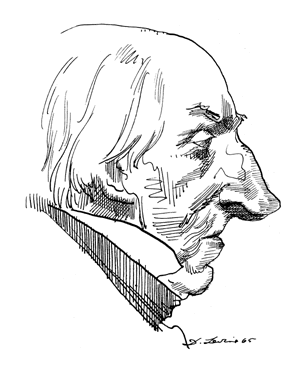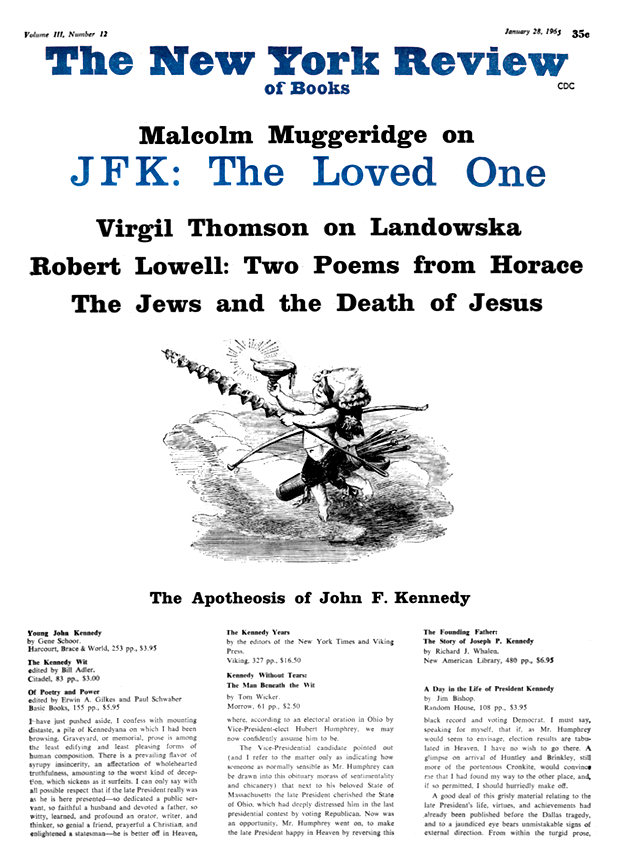Among the things which Coleridge “lamented” about Wordsworth’s poetry was that “his genius was not a spirit that descended to him through the air; it sprang out of the ground like a flower.” Geoffrey Hartman might have taken this remark as an epigraph for his fine book. His argument is that it is just exactly here that Wordsworth’s true genius lay: in his ability to respect the earth and the air, to hold nature and imagination in balance, indeed in magnanimous reciprocity. If Wordsworth’s poetry reaches great heights, it is as an arch does, by stresses that meet and support each other in loving opposition. Coleridge was wrong to deplore in Wordsworth “a something corporeal, a matter-of-fact-ness, a clinging to the palpable.” Not that such matter-of-fact-ness is in itself enough. It may, as Wordsworth said, make the mind “a mere pensioner on outward forms.” The travelers who see Mont Blanc grieve:
To have a soulless image on the eye
That had usurped upon a living thought
That never more could be.
But “usurp” is the key-word; the visual must not claim sway over the visionary, nor vice versa. Rather they must be held in vibrant counterpoise, the physical world and the gigantically autonomous powers of the human mind:
He feels that, be his mind how- ever great
In aspiration, the universe in which
He lives is equal to his mind, that each
Is worthy of the other; if the one
Be insatiate, the other is inex- haustible.
As verse, not remarkable: the stated aspiration rather than the achievement itself. But all the same the lines do provide an invaluable summary of the true relationship between nature and imagination, each respecting the other, each inexorable yet gentle in its power. In his important, various, and stimulating book, Mr. Hartman shows conclusively that Wordsworth’s progress was towards a true understanding and expressing of this relationship, and that his decline (notably in The Excursion) must be connected with his inability to maintain any longer this fatiguing and precarious balance. The Excursion sells the visible world grievously short—and in doing so, makes imagination not more but less effective.
Wordsworth’s “consciousness of consciousness” is the theme when Mr. Hartman confronts Wordsworth’s imagination. In “The Solitary Reaper,” “there is an inward sinking, as if the mind, having been moved by the Highland girl, is now moved by itself.” Such self-consciousness could easily become all to reflective, too much a mirror seen in a mirror seen in a mirror…Arthur Hugh Clough, incidentally, taunted this aspect of Wordsworth in nothing that “he is apt to wind up his short pieces with reflections upon the way, hereafter, he expects to reflect upon his present reflections.” But what saves Wordsworth—at his best—from such dithering or solipsism is his counter-respect for nature. Mr. Hartman quotes Petrarch’s loftiness: “nothing is wonderful but the soul, which, when great itself, finds nothing great outside itself.” Wordsworth’s ideal (achievement, too) was more loving and more generous. In Mr. Hartman’s summary:
The child grows from a stage in which it walks with nature, to one in which it is in search of nature, and finally to a crisis when nature no longer suffices. This crisis is overcome when it is seen that Nature itself taught the mind to be free of nature and now teaches the mind to be free of mind and mingle with nature once more.
A noble ideal, and yet in Wordsworth’s hands not an airy one—on the contrary, one that is very human in its aptness to many kinds of love, parental love especially. An ideal of mutuality, and of respect for difference, which makes Wordsworth so much greater than any half-poet of nature alone or of imagination alone.
Mr. Hartman offers some extremely revealing comparisons, for example with Milton and Virgil; but the real battle, as he shows, is between Wordsworth and Blake. If Wordsworth were to be thought to triumph, that would be because in the end his sympathies and ideals were more inclusive, more hospitable, than those of the poet who was compelled to say: “Natural Objects always did and now do weaken, deaden, and obliterate Imagination in Me.” Mr. Hartman’s formulation is excellent: “beyond but not away from” nature. The relationship has the inseparable interdependence which we find both in the poet’s largest conceptions and in, say, a true metaphor: vehicle and tenor, perhaps, but the vehicle is not a cab which you can curtly pay off when it has served your turn. Wordsworth’s poetry respects the dignity of all things (note the dignity to which it raises the very word “thing”), including “unknown modes of being,” and, in so doing, it creates for itself respect and dignity.
But Mr. Hartman’s book is implicitly an attempt to right a balance. What ever disturbed it? The fact that the modern reader is now far less sensitive to beauties of literalness than to beauties of imagination. The reciprocity of the visual and the visionary is certainly Wordsworth’s theme and his achievement. And it is natural enough that Mr. Hartman should not think it necessary to go on laboriously about Wordsworth’s triumph of literalness—natural, but also dangerous, since our own imbalance, our own blindness to the literal and our hyper-sensitivity to the significant, is now likely to distort our reading of Wordsworth. Take the famous boating episode in The Prelude:
Advertisement
A rocky Steep uprose
Above the Cavern of the Willow tree
And now, as suited one who proud ly row’d
With his best skill, I fix’d a steady view
Upon the top of that same craggy ridge,
The bound of the horizon, for be- hind
Was nothing but the stars and the grey sky.
She was an elfin Pinnace; lustily
I dipp’d my oars into the silent Lake,
And, as I rose upon the stroke, my Boat
Went heaving through the water, like a Swan;
When from behind the craggy Steep, till then
The bound of the horizon, a huge Cliff
As if with voluntary power in- stinct,
Uprear’d its head. I struck, and struck again,
And, growing still in stature, the huge Cliff
Rose up between me and the stars, and still,
With measur’d motion, like a liv- ing thing,
Strode after me. With trembling hands I turn’d,
And through the silent water stole my way
Back to the Cavern of the Willow Tree.
Mr. Hartman writes briefly of all that is mysteriously powerful here, but what he does not say is why, literally why, the cliff uprears its head. Cliffs, after all, do not. And the strength of Wordsworth is precisely that he respects the literal as much as the imaginative. The answer, a natural effect of perspective, is so obvious that it would hardly seem worth mentioning—were it not that Robert Langbaum (a critic whom Mr. Hartman rightly praises) had this to say: “The sudden appearance so broke up his normal perspective that the mountain seemed to have a will of its own, to be approaching him instead of his approaching it.” Wrong, because the movement of the cliff does not “break up his normal perspective,” it was caused by his natural perspective. Wrong, again, because there was no question of the cliff’s “approaching him instead of his approaching it“: the boy is rowing away from the cliff. Like all rowers, he does not face where he is going. Which is why, as the boy rows out from under the shelter of the lower ridge, the huge cliff uprears its head—and then as if in a dream pursues him. It grows in stature “with measured motion”: but the measured motion is literally that of the oars, every stroke of which (far from shaking off the pursuer) does of course bring more of the cliff above the horizon, making it even more menacingly the pursuer. Hence the feeling of nightmare: the more he tries to escape, the more it comes after him. Hence, too, the courageous and fearful decision: “With trembling hands I turn’d.” The only way to escape the cliff was to turn and row back towards it, with it there at his back. Mr. Langbaum’s slip here is crucial.
For one thing, Wordsworth is obsessed with confrontation. Mr. Hartman has a brilliant discussion of the Deluge dream in The Prelude: “the poet’s fear grows once more, and he is forced to turn with the Arab’s glance, to face the pursuing flood. But then he wakes, and the flood seems to have passed over, for he discovers the sea before him.” Yet even more important is that we must never attribute to Wordsworth our own contempt for, or carelessness about, the literal. When the cliff upreared its head, it was for an explicable reason—though, of course, a reason which does not circumscribe the significance of the event. Likewise with the skating episode. One sort of partial poet might describe the dizzying effect of stopping back upon your heels while skating, and yet might leave this a literal description only. Another might tell us, with altitudinous self-indulgence, that for no explicable reason he has seen the world revolving. The greatness of Wordsworth is that he outdoes both these poets, his imagination not holding despotic sway over his sense of fact. Nor vice versa—but then the symbolizing or aerial habits are now so strong that most people are almost too ready to agree that there is something wrong with the man to whom a primrose by the river’s brim was a primrose and nothing more. But Wordsworth insists too that the primrose is nothing less. A primrose is a primrose is a primrose. Which is why Wordsworth is so ineffably greater than Wallace Stevens, a poet who, not unexpectedly, provides an epigraph in this book. If imagination were all…Blake’s aspiration, “If the doors of perception were cleansed…,” is aptly quoted. But the great thing about Wordsworth is that he sets about cleansing the doors of perception in order that things and ideas and feelings may pass through the doors. Meanwhile Stevens is cleansing away; briskly applying a disinfectant wit, and hardly noticing how little traffic there actually is through his doors. The legitimate concern with the poetic imagination has now reached so engrossing a stage as to make me think that Mr. Hartman has underrated his duty to help a modern reader to see how beautifully effective Wordsworth’s literalism is, how strong and how worthy a partner for his imagination. Mr. Hartman refers to Eliade’s Patterns in Comparative Religion in order to support his idea that Wordsworth’s “obsession with specific place” has to do with the omphalos. A very different thing from the poet’s sitting there contemplating his own omphalos.
Advertisement
This Issue
January 28, 1965



